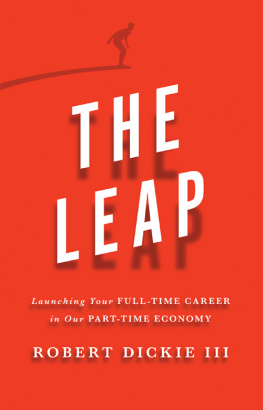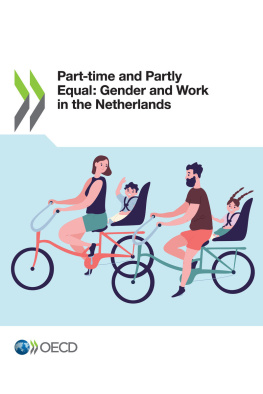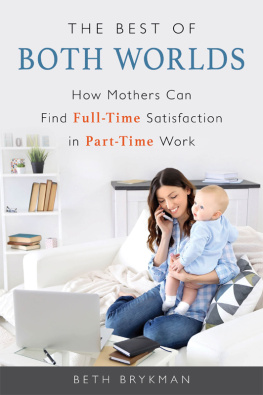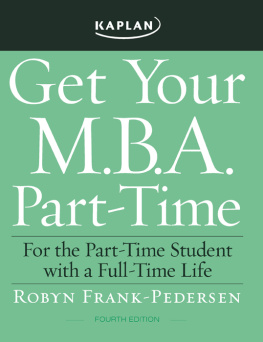THE PART-TIME
PARADOX
TIME NORMS, PROFESSIONAL LIVES, FAMILY, AND GENDER
Cynthia Fuchs Epstein, Carroll Seron, Bonnie Oglensky, and Robert Saut
First published 1999 by Routledge
Published 2013 by Routledge
2 Park Square, Milton Park, Abingdon, Oxon OX14 4RN
711 Third Avenue, New York, NY, 10017, USA
Routledge is an imprint of the Taylor & Francis Group, an informa business
Copyright 1999 by Routledge
All rights reserved. No part of this book may be reprinted or reproduced or utilized in any form or by any electronic, mechanical, or other means, now known or hereafter invented, including photocopying and recording or in any information storage or retrieval system, without permission in writing from the publishers.
Library of Congress Cataloging-in-Publication Data
The part-time paradox: time norms, professional lives, family, and gender / Cynthia Fuchs Epstein [et al.].
p. cm.
1. Part-time lawyersUnited States. 2. Practice of lawUnited States. I. Epstein, Cynthia Fuchs.
KF300.P37 1999
340.02373dc21
98-20948
CIP
ISBN 13: 978-0-415-92123-7 (hbk)
ISBN 13: 978-0-415-92124-4 (pbk)
TABLE OF CONTENTS
Many people, working part time and full time, have contributed to this book.
Qualitative research is a long and expensive process. We are grateful to the Alfred P. Sloan Foundation, which funded the major part of the study on which the book is based as part of its interest in work/family issues and the use of professional workers skills. The study was developed through discussion with Hirsh Cohen, vice president of the Sloan Foundation, and Kathleen Christensen, program officer at the foundation, both of whom were of great assistance.
The book also drew on a study of lawyers in large corporate law firms, Glass Ceilings and Open Doors: Womens Advancement in the Legal Profession, that was funded, in part, by the Association of the Bar of the City of New York. Its president, Barbara Paul Robinson, was extremely helpful to us in following through with this study. We also want to express great appreciation to the members of the Lawyers for the Advancement of Alternative Work Schedules (LAAWS Network) and its leadership, especially Jolie Schwab and Nora Plesent, for providing us with insight as well as the names of part-time attorneys to interview for this study.
We are also grateful for additional financial support for the study provided by grants from the Professional Staff Congress of the City University of New York.
The book was completed while one of its authors, Cynthia Fuchs Epstein, was a visiting professor at the Stanford Law School. We are grateful to Paul Brest, dean of the law school, for his generous provision of space, time, assistance, and an extraordinary intellectual atmosphere in which to complete the work. We are further indebted to Nancy Strausser, assistant to the dean, for her tangible and moral support; to the library staff, among them Andy Eisenberg, Dave Bridgman, Erika Wayne, and Paul Lomio, who not only tracked down source materials but came up with new ones; and to Carol Crane and Joy Nabi, who cheerfully and ably shepherded the manuscript through various revisions. Furthermore, the year at Stanford could not have come about without the encouragement and advocacy of David Rosenhan, professor of psychology and professor of law. He and Professor Mollie Rosenhan further opened doors to a most congenial scholarly community and circle of friends for this year. We also thank Epsteins Legal Profession seminar partner and longtime colleague, Deborah Rhode, professor of law, who stimulated thoughts about the dynamics, goals, and prospects of professional responsibility.
), and as always, his sociological vision, were of value beyond description.
We are also deeply grateful to Howard Epstein, who put aside his own writing and research to apply his considerable editing skills to the final version of the book, and whose intellectual power we have relied on for thinking about the small matters and broader issues.
And, we thank Heidi Freund, of Routledge, for appreciating the significance of our work and guiding it through publication.
We especially wish to thank the lawyers who participated in this study and who offered their thoughtful and reflective accounts of the experience of part-time work. In lives in which time is such a precious commodity, they were most generous in sharing theirs with us.
THE SOCIAL MEANING OF PROFESSIONAL TIME
INTRODUCTION
Trisha Wood, Hannah Kairys, and Leila Rubin Webb are experienced attorneys who sought reduced work schedules to put a cap on escalating hourly schedules when their second babies came along. The three practice law in very different surroundings, but they share two goals that are important to themto continue their careers as lawyers and to spend more time with their growing families. These goals increasingly had come into conflict as their careers advanced and time demands in the profession intensified, making it unlikely they could have a life. Each was lucky enough to work in an organization that permitted attorneys a reduced schedule (and, of course, a reduced salary) and to have sympathetic supervisors who worked out schedules that met their and their organizations needs. Though the new work arrangements did make it possible for the three to combine work and family life, they found that the solution to the family/work conflict incurred costs, many of them unanticipated. Little did they realize that there is a politics of time in professional life.
Although relatively few lawyers choose to work part-time, the observation that legal careers have increasingly entailed grueling pressures and the submission of every other aspect of lawyers liveshome, children, and private pleasuresis no longer accepted without protest by a new generation of attorneys. These pressures and an antipathy to them exist among younger practitioners in other professions as well. The part-time option is drawing attention as one way to cope with discontent within the professions.
Working in three of the law professions major sectorsprivate law partnerships, corporation legal departments, and governmentWood, Kairys, and Webb are among more than 100 lawyers who were interviewed extensively for a study devised to learn what happens to lawyers who turn to part-time work as a way of solving the conflict they face in managing careers, which seem to be ever more demanding of professionals time at work, and at the same time reserving the time and energy needed to be loving and responsive parents. Wood now works four days a week in-house, in her high-tech corporations internal legal department. Kairys went on a five-day 9-to-6 schedule in a large corporate law firma law partnership specializing in legal work for corporationswhere she is an eighth-year associate, a lawyer just beneath partnership in rank. Webb chose a three-day workweek in a federal agency office where she has worked for six years.
Part-time arrangements have served these three lawyers well in reconciling their work and family obligations. They like their schedules, are grateful to have them, and feel they are doing the right thing. But the solutions have brought some wide-ranging and unexpected problems. The womens careers are on hold. They face disapproval from colleagues who believe they are neither fish nor fowl: not good lawyers or good mothers. Some of the lawyers they work with are envious, and some regard the part-time arrangement as an unfair burden on them. Kairys often finds that her 40-hour schedulewhich would be regarded as full-time in most jobsstretches until 9 or 10 oclock at night when a high-profile case demands it, so that she works full-time or more for a part-time salary. The other two women have more predictable work lives with more defined time boundaries, but they are struggling to gain recognition for their skills and respect for their seniority.










